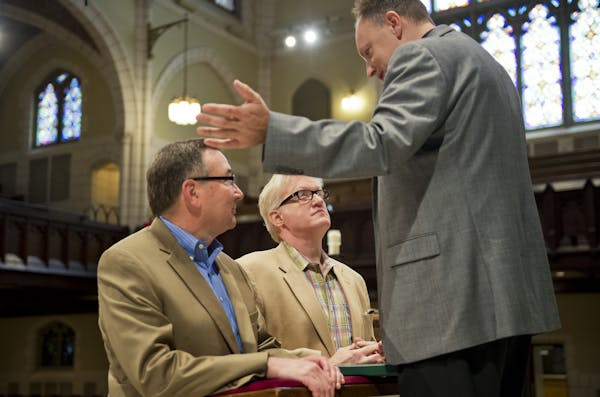So, who's the bride?"
That's the question Greg Leatherman has been asked while planning his wedding. But there is no bride. Leatherman is marrying his longtime partner, Brent Malley, in a few weeks, then having a celebration next summer.
Like most engaged couples, Leatherman and Malley, both of Minneapolis, have vetted the caterer, florist and photographer — not just for price and availability, but for their stands on same-sex marriage. They've scoured potential vendors' websites for clues, even checking Twitter feeds for reactions after legislation passed making gay marriage legal in Minnesota on Aug. 1.
"The last thing we want is a lecture or rejection when trying to plan our wedding," Leatherman said. "If you want to avoid that kind of ugliness, you have to prepare."
Local wedding businesses, with little or no experience with same-sex weddings, are trying to maneuver successfully through this new terrain and leverage what they expect will be a significant boom in business when the law takes effect next week. "We are very excited to increase the number of weddings expected to take place in the Twin Cities by 5,000 in the next three years," said Amy Zaroff, owner of Amy Zaroff Events + Design. "That could mean as much as $130 million to the local wedding industry."
Their counterparts in states where gay marriage has been legal for a while say the payoff could indeed be sizable — if they do it right.
Iowa wedding planner Beau Fodor said gay marriage could mean big business for the Twin Cities wedding industry, but he cautioned that vendors have to take a thoughtful approach.
"Gay-wedding planners are starting to come out of the woodwork," he said. "Anyone can plan a gay wedding, but to be a good gay-wedding planner, you have to be kind, sensitive and very politically educated. There's this little issue called homophobia. Vendors need to feel comfortable dealing with those issues very matter-of-factly."
Twin Cities wedding planners say they are trying to figure out how to welcome gay couples without pandering, still appeal to straight couples and avoid alienating anyone.
"You will lose some clients," said Julie Schanke Lyford, a Twin Cities wedding planner who has arranged commitment ceremonies for same-sex couples. "Once you add LGBT imagery to your website, certain clients aren't going to want to hire you anymore. It's touchy."
Open for business
When the same-sex marriage bill passed in Iowa in 2009, photographer Paula Maxheim asked herself, "How am I going to deal with this?"
"I was on the fence, but then I took a second look," she said.
After photographing at least 25 same-sex marriages, Maxheim hasn't changed her opinion on gay marriage, but, she says, same-sex couples have been some of her best clients.
"They do have a lot of discretionary income. From a financial standpoint, they're excellent to do business with," she said. "As individuals and as human beings, I respect their lifestyle and their love for each other."
There's a lot of money to be made on gay marriage. In fact, same-sex couples are likely to spend slightly more than the national average of $28,427 on their weddings, according to a 2012 survey by TheKnot.com and WeddingChannel.com.
Already, Twin Cities wedding businesses are trying to signal their openness to same-sex customers.
LGBT imagery is prominently displayed on websites. Contracts are being reprinted to read "couple," instead of "bride and groom." DJs are asking how each couple wants to be introduced at receptions. Retailers are promoting gender-neutral registries.
Companies that don't adapt, however, are at risk of losing potential clients — or, worse, running afoul of state law.
"Business owners who have deep religious beliefs are going to have trouble with this," warned Maxheim. "But they can't discriminate. It's against the law."
Last month, a gay couple pursued a discrimination complaint against a Colorado bakery, saying the business refused them a wedding cake to honor their Massachusetts ceremony. The baker faces a year in jail. So far, there have been no discrimination complaints filed against wedding vendors in Minnesota.
As more gay couples choose to marry, those in the wedding business will confront new questions. But Schanke Lyford is convinced that vendors will learn that gay weddings aren't all that different from straight weddings. "They'll have to be a little more mindful now," she said. "But in the end, it's two people, in love, getting married. Period."
Staff writer Andrew Wagaman contributed to this report Aimee Blanchette • 612-673-1715
Live video of man who set himself on fire outside court proves challenging for news organizations
4/20 grew from humble roots to marijuana's high holiday

